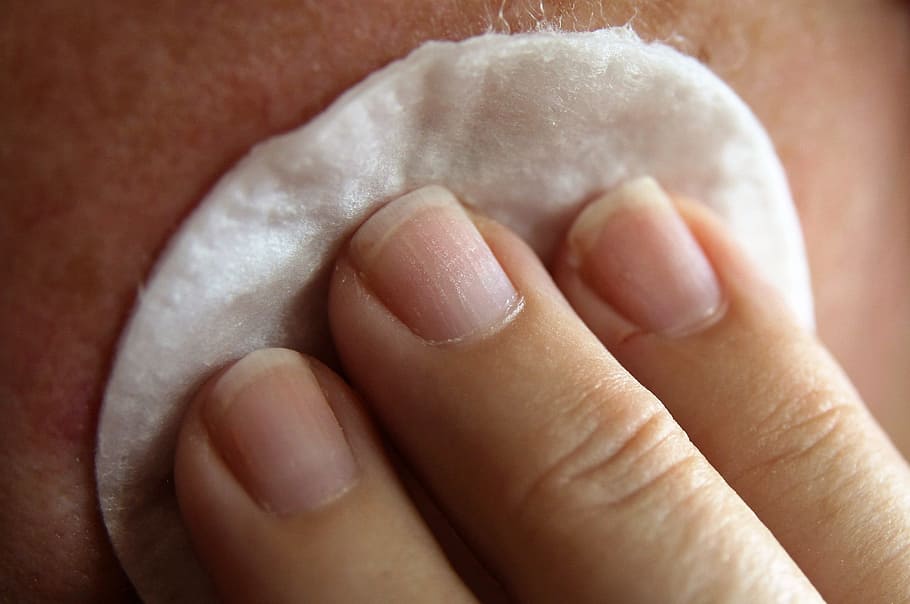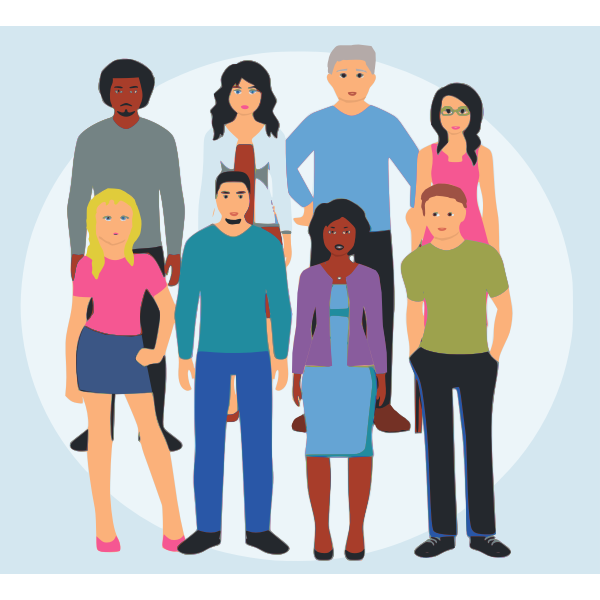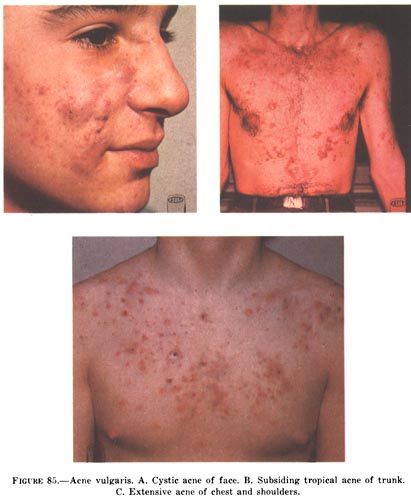How To Get Rid Off Acne
Acne - Know about whiteheads and blackheads for clear skin

Acne develops on the hair follicles to which sebaceous glands are attached. These glands produce an oil called sebum. For certain reasons, the sebum changes in quality and quantity, causing flakes on the hair follicles. This blocks the skin pore and causes acne. This blockage is the beginning of acne.
The first stage of this blockage appears as blackheads and whiteheads. These are also called comedones. A comedo is a sebum follicle that is clogged and filled with sebum, dead cells, etc. An open comedo is called a blackhead because of its blackish appearance. A blocked comedo is called a white head, which is a small bump in the skin with a skin-like color. A whitehead has a closed mouth and the blackhead has an open mouth.
What to do if you have blackheads or whiteheads - don't squeeze them yourself. This can leave permanent scars and an infection. It is best to approach a dermatologist who will open them under sterile conditions if necessary. Keep in mind that acne scars can permanently disfigure you.
As for basic care, wash your face gently with slightly warm water and mild soap to remove excess sebum and dead skin. Don't be harsh on the skin. Keep in mind that acne takes time to clear. Apply a topical cream prescribed by your dermatologist. Acne treatment requires patience. Many of us are in a rush to get rid of acne and cause further inflammation.
This article is for informational purposes only. This article is not intended as medical advice and it is not a substitute for professional medical advice. Consult your physician for your medical concerns. Follow each tip in this article only after consulting your doctor. The author is not liable for any outcome or damage arising from information obtained from this article
The types of people who get acne

Acne is a skin condition that affects millions of people around the world. Acne occurs when there is an excessive secretion of sebum, a substance from the hair follicle. The excess secretion becomes the target for dust and bacteria to accumulate and develop into acne later on.
Acne can affect people of all ages and races. But the incidence of acne is very high in adolescents. According to studies, nearly 85 percent of adolescents and young adults between the ages of 12 and 24 develop acne to varying degrees.
During adolescence, a person's hormonal levels are increased and they stimulate the sebaceous glands attached to the hair follicle. As a result, a greater amount of sebum is secreted.
Between the ages of 10 and 13, young people are most vulnerable to acne. Normally acne usually lasts 5 to 10 years, although there are many cases where acne is experienced later in life.
People with poor hygiene are at risk of developing acne. Because acne is caused by bacteria, people who are exposed to dust and dirt and don't wash their face at bedtime are likely to develop acne. Also, a person who uses dirty pillowcases has a higher risk of acne.
Acne can also be inherited. Thus, people with a family history of acne are also at risk of developing acne.
People taking certain medications, such as those used to treat epilepsy and depression, may be at risk for acne.
Acne affects both men and women. But men are more likely to get more severe and long-lasting acme than women. Even then, more women have a close relationship with their dermatologist than men.
Intermittent acne affects women due to hormonal changes that usually accompany their menstrual cycle. This form of acne is also caused by overuse of cosmetics. Some cosmetics, especially those that are not oil-free or non-comedogenic, can attack the pores of the skin and develop acne later on.
More women than men become infected with perioral dermatitis characterized by small pustules and papules on the chin and around the mouth.
Men and women who like to wear tight hats, backpacks, jeans, or other tight gear and paraphernalia are at risk of developing acne, as friction from the skin can cause irritation and eventually cause acne breakouts.
Middle-aged adults are most likely to develop acne rosacea. The effect of this type of acne includes red face and nose due to inflamed bumps.
Infantile acne affects newborn babies. This is a mild form of acne caused by fetal hormones. After a few weeks, childhood acne will disappear on its own.
More men suffer from a severe form of acne called Acne conglobata. This type of acne is an advanced form of nodular cystic acne vulgaris and can seriously affect the face, chest and back.
Another interesting study states that the incidence of acne is higher in Caucasians than in other colors.
Understanding Cystic Acne

Understanding cystic acne will help you treat this condition on your own body. For many people it is traumatizing because their appearance is flawed due to these small but powerful infections. The skin here becomes inflamed and can even hurt. The irritants are likely bacteria and a combination of other factors. The bottom line, however, is that people want and need results when it comes to treating cystic acne.
What causes it?
Cystic acne is caused when the oil channels in the skin become blocked. This will cause the channels (or pores) to become infected. The oil channels produce too many oils which are generally needed to keep the skin moist and for the hair follicles to disappear from the skin. But for many teens, hormones are all out of control and this can cause these oil glands to simply produce too much oil. Eventually, bacteria make their way to this area and irritate it enough to cause the infection on the skin. This is what cystic acne is.
Treatments for it
While the causes of cystic acne are important, the treatments for it are just as important to those who suffer from it. Many people, especially teenagers, will experience this type of acne for at least several years of their lives if they have the right conditions for it. But the good news is that there are acne treatments that can actually work and work well for them. The best acne treatments are those that cover all aspects of the condition.
1. They must treat the bacteria that infect the skin.
2. They must stop or slow the production of oils by either destroying the oil glands or controlling hormone levels.
3. They must protect the face from new infections through methods such as cleansing and exfoliation.
There are acne products available that can do all of these things. If you're like most, you'll want to get started right away. Start with natural acne products and then work on the acne treatments that don't work. You will soon see that cystic acne can respond to medication and treatment.
Home remedies for acne and other.
The people are tired of the side effects of the drugs and are now turning to alternative therapies for the cure and treatment of common problems. Home remedies are one of the alternative methods that have been proven to be inexpensive and can be easily made at home without much effort.
For centuries our ancestors used these home remedies to treat disease, but the latest inventions and discoveries in the field of medicine have obscured the benefits of these homemade treatments. In recent times, people have shifted back to these home remedies.
Home remedies for acne, arthritis, asthma, anemia, back pain, cold, constipation, eczema, hair loss, high blood pressure, indigestion, obesity, sore throat, stress
Home remedies for some of the most common illnesses and problems include:
Acne
Apply cucumber leaves or shredded cucumber pieces to the affected areas.
Sticking fenugreek leaves applied to the affected area at night and washed off the next morning is also effective.
Mix a tablespoon of besan flour and a teaspoon of lemon juice until a smooth paste is formed. Apply to neck and face and wash off when dry.
Acidity
Drink a glass of cold milk to get quick relief from the acidity.
Drink a glass of water with a teaspoon of baking soda for instant relief.
Chewing gum also provides acidity relief in minutes.
Arthritis
With an empty stomach, take 3-4 walnuts (akhrot) or 1 fresh coconut.
Smear warm mustard oil on a madar leaf and apply it on the affected area for a few hours.
Drink some radish juice with added sugar.
Asthma
Drink a cup of black coffee, the heat will break up the custard, and the caffeine will help remove the tightness in the chest and throat.
Add 30-40 leaves of tulsi to a liter of water, strain the leaves and drink the water throughout the day.
Anemia
Eat 2-3 apples daily without peeling to increase the body's iron stores.
Intake of beet juice is very beneficial for the anemic person.
Backache
Drink some hot milk or water with powdered sonth, meetha soda and salt.
Massage the back with turpentine oil.
For temporary and quick relief, heat can be applied to the back with a hot water bottle.
for natural home remedies for various ailments, diet, lifestyle, causes and symptoms and natural herbal remedies and herbal treatment
Common cold
Drink a cup of water with a few drops of garlic oil and a teaspoon of onion juice.
Rub the chest and throat with camphor water or oil.
Drink honey and lemon juice in hot water to relieve a sore throat.
Constipation
Drink a tablespoon of corn syrup in a cup of water.
Drink a glass of prune juice to ease bowel movements.
Drinking a cup of coffee will also provide relief from constipation.
Eczema
Mix a teaspoon of camphor and a teaspoon of sandalwood into a paste and apply to the affected areas.
Drinking Aloe Vera juice helps to cleanse the system.
Hair loss
Wash hair with peppermint or spearmint tea to prevent hair loss and promote hair growth.
Wash hair regularly with white vinegar to prevent hair fall.
High bloodpressure
Mix half onion juice and half honey. Take 2 tablespoons once a day for 1-2 weeks.
Eat two cloves of garlic every morning.
Eat a papaya daily on an empty stomach for a month.
High blood cholesterol
Drinking onion juice daily for a week lowers blood cholesterol.
Eat a few cloves of garlic every day to lower blood cholesterol.
Indigestion
Drink aloe vera juice, papaya juice, or chamomile, comfrey, red raspberry, or peppermint tea.
Drinking a glass of water with a tablespoon of baking soda provides instant relief.
Obesity
Eat 10 fresh curry leaves in the early morning for three or four months.
Drink a cup of water with 3 teaspoons of lime juice, a fourth teaspoon of black pepper powder and a teaspoon of honey every day for three months.
Eat freshly sliced tomatoes with onion and lemon juice.
Drink lemon juice with honey and warm water every morning.
Sore throat
Gargle every hour with vinegar or salt water.
Drink warm milk with honey before bed for instant relief from a sore throat.
A teaspoon of honey will provide relief from a sore throat.
Tension
Chewing 12 tulsi leaves twice a day, morning and evening, is the very beneficial treatment for stress.
Various seeds such as alfalfa, sunflower and pumpkin are very beneficial in the treatment of stress.
Using these home remedies is very effective and does not cause any side effects on the physical body.
5 easy ways to cure acne naturally
How To Cure Acne Naturally - 5 Easy Ways

Mentioned here are some ways to heal acne naturally. Most of the time, we don't have the budget to maintain clear and healthy skin. For some people, getting facial sessions or buying expensive anti-acne facial products is just a norm, but for some it isn't.
But one thing is certain: an acne breakout can affect anyone. So for those who don't want to spend tons and tons of money to maintain smooth, pimple-free skin, follow these simple steps that would definitely make you a Hollywood star.
1. Use facial soaps specifically designed for acne. Today, there are sulfur-based soaps that are made to quickly cure and dry acne. Wash your face at least twice a day. The first wash should be done in the morning when you wake up and secondly, in the evening before going to sleep. As tiring as your whole day has been, don't forget to clean your face before you nap to clear your pores of any pollutants you have been dealing with. However, if you occasionally wash your face regularly, the sebaceous glands can produce more sebum, making it more prone to acne breakouts.
2. Drink plenty of water every day. If possible, continue with a juice or fast with water. This is the easiest way to heal acne naturally. It's not really a hassle to do that. Offices and schools now have water stations, so you don't have to bring bottles with you when you go to work every day. Drinking liquids is essential for everyone's health. It is also responsible for flushing out toxins from the body that cause breakouts and other acne flare-ups. While you may need a few trips to the laundry room, it's worth it.
3. To heal acne naturally is as simple as not picking or squeezing your seeds. It's really tempting, but touching the affected area, especially if you have unclean hands, can increase sebum production. Once a pimple or blackheads were squeezed, the membranes under the skin have actually ruptured causing the sebum to spread under the skin and cause an infection.
4. Try to participate in activities such as yoga, gym trips with any kind of exercise. You can eliminate toxins with these activities by sweating. Detoxification is key. This is not a healthy way to heal acne naturally, but it would also give you a fit and stronger body.
5. Replace your pillowcase after two days. Your pillowcase will absorb all the oil and dirt while you lie on it every day. Keep your sheets clean to avoid reapplication of the dirt and oil, which would certainly lead to even more acne breakouts.
Acne is like any other form of illness that can be cured without the help of drugs and drugs or expensive products. Just follow these simple ways to heal acne naturally and you will have clearer and healthier looking skin.
Vitamins used to treat acne
Because of the incredibly unhealthy diets that have become the norm in modern America, it's no wonder vitamin deficiencies are so great. Only about 10-20% of Americans consume the recommended amount of the important vitamins and minerals on a daily basis.
There are many vitamins, all of which can help fight and prevent acne formation on the skin. Different vitamins have different uses, ranging from antioxidants (removing harmful toxins from the skin) to antibacterial (fighting bacteria that can cause acne and help prevent it from forming) and more. This article explains and explains which vitamins can be used to combat acne and what they do.
The main vitamins that help fight acne are vitamin A, the vitamin B, vitamin E, vitamin C, chromium and zinc. Each of these vitamins help to fight acne in a different way and when used in combination can significantly reduce the effects of acne and even prevent it from breaking out altogether.
Vitamins A and E are strong antioxidants and help promote healthy skin. Zinc is also an antioxidant, but more importantly, it helps regulate oil production in the oil glands. Chromium helps reduce the infections in the skin that can prevent acne from spreading.
The main reason each of these vitamins is so important is not only their help in fighting and preventing acne, but the simple fact that a deficiency in any of these vitamins can lead to acne breakouts. Therefore, the importance of consuming the correct amounts of these vitamins daily through a diet, which can be very difficult, or simply in supplement form is undeniable.
...
-
The people are tired of the side effects of the drugs and are now turning to alternative therapies for the cure and treatment of common pro...
-
...
-
Any conversation about acne includes terms like whiteheads and blackheads. What are they and why are they so called? Let's find out. A...




